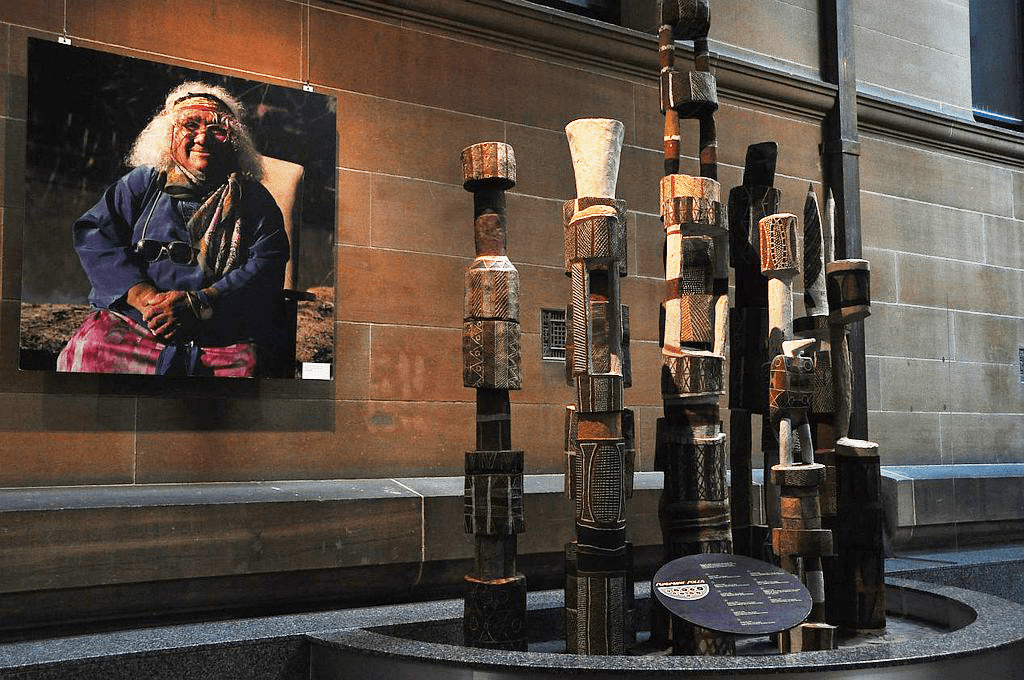As cultural institutions return, it is hard to shake the infiltrating presence of colonial agendas.
Emerging from pandemics and in-person restrictions, museums, galleries, and theatres are intent on making up for lost time. Years spent inside meant years spent away from the intangible strength of learning from tangible cultural works. The ability to walk through an exhibition, to be on-site and spend undistracted time in the presence of artefacts and performances, is an experience that significantly differs from the virtual events that were offered during lockdown.
However, the current discussions around the Indigenous Voice to Parliament and the cultural policy Revive have ignited an increased political consciousness about the presence of First Nations people and experiences in our cultural institutions. Both officials and the public are demanding more. More workshops. More events. More chances for learning.
Hayden Walsh, a Wiradjuri man and First Nations Advisor at Sydney Living Museum, spoke to this development of demand.
“Everywhere is wanting to do something… it’s on budgets, it’s on meeting agendas and people are talking about it. Most places are starting to realise that they need to make some changes to their ways of working.”
This ignited interest is beneficial and needed.
However, in the effort to begin to decolonise the enormity of injustice that is embedded in these institutions, First Nations perspectives and concerns are being ignored. Institutions are favouring meeting the demand quantitatively, rather than qualitatively.
This is not to say that more exhibitions and programs focusing on Indigenous perspectives are unnecessary. Nevertheless, there is a real danger of this becoming tokenistic, inauthentic, and burdensome for the First Nations individuals contributing to them.
Walsh recalls his attendance at events that are essentially “wannabe Easter shows.”
“I’d say 9 times out of 10, you’ve got non-Indigenous people running [the events], like some council person, and they’re just sort of putting something on.”
These organisers, driven by commercial and political interests, fulfil what they are trained to do: maximise turnout and publicity.
“And so, they’ll usually partner with companies to have a tent. So you get these things like a Westpac tent with a goodie bag. What does that have to do with NAIDOC?”
Superficial efforts claiming to “decolonise” Australian institutions, while holding the hand of wealthy corporations, is hardly a new sensation. What Walsh feels needs particular attention, instead, is the individual burden being placed on First Nations individuals to produce these events.
However, the traditional model of demand and supply for labour is alarmingly poorly fit for this situation. The qualifications, experience, and knowledge that these roles require is not something that can be formally taught. As of June 2021, 3.8% of the Australian population identified as being of Aboriginal or Torres Strait Islander descent; further, education in Australia on First Nations history remains in a woefully inadequate state.
To highlight the difference between his work and other roles, Walsh used the example of an accountant. If an accountant is underappreciated and undervalued, it is unlikely that the assessment of their work carries enormous weight. Budgets and financing are unlikely to be a full reflection of who they are.
Reflecting on his position, Walsh speaks to the nuances of cultural awareness. “Culture roles are different because it’s your identity…. Instead of spreadsheets and Excel and all of that, I’m bringing my relationships. My connection with community and country. Some people are bringing their language. Some people are bringing their family traditions and stories.
“If you’re not feeling appreciated, it’s like ten times the pain.”
This threat of underappreciation is a prevalent reality. Walsh uses the example of the “bare minimum” of Acknowledgements of Country. While absolutely necessary, it signifies a “tick the box” approach to the demand that fails to comprehensively include First Nations presence.
The solution, Walsh believes, lies in putting First Peoples first.
“For so long our side of the story and our involvement in things has been so last minute.”
By placing the First Nations perspective at the forefront, an experience currently ignored in favour of showy sponsorship and corporate pats on the back, events become not about First Nations, but instead with them.
It is not enough to simply hold these events. It is not enough to have roles designated for First Nations perspectives. Without thorough involvement with First Nations people, sensitively recognising the higher stakes and enormity of their contribution, events become inauthentic and harmful.
Too often, loud calls for decolonisation ultimately conclude in perpetuating colonial values. We must stop disenfranchising and exhausting Indigenous contributions, we must stop ignoring radical opportunities for dismantling systems of oppression, and we must actually listen.





